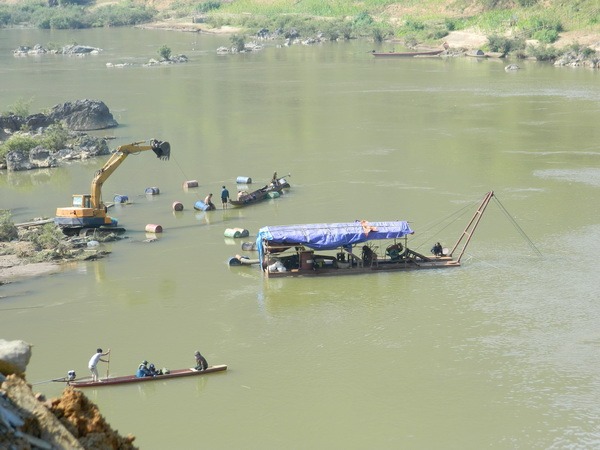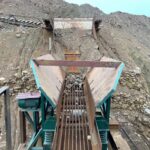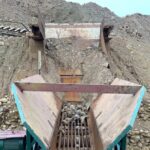The Indus River, one of the oldest and longest rivers in the world, has recently unveiled a golden secret. In the Punjab province of Pakistan, near Attock, locals are believed to have discovered gold mines, attracting widespread attention. Experts estimate the gold to be worth approximately 600 billion Pakistani rupees, a staggering amount equivalent to $2.13 billion USD.
If verified, this discovery could bring immense economic benefits to the region and potentially reshape the country’s financial landscape.
According to the Nav Bharat Times, the gold found in the Indus River is believed to have originated from the northern mountains of Pakistan, specifically the Himalayas. This process began millions of years ago when the collision of tectonic plates formed the mountains, causing erosion and releasing gold particles into the river.

Illustration of alluvial gold mining in a riverbed.
Carried by the swift waters of the Indus, these particles eventually settled in the riverbed. This natural process, known as alluvial gold mining, results in the accumulation of significant amounts of gold in specific areas of the river.
Various media outlets report that the Attock district is believed to hold gold across a 32-kilometer stretch, estimated at 32.6 tons of gold, worth 600 billion rupees.
As news spread, locals began mining the riverbed, largely through illegal means. The Nav Bharat Times reports that the government is taking action to halt these illegal mining activities. Officials within Pakistan’s Ministry of Mines and Minerals are also hindering efforts to explore and extract this resource, instead focusing their attention on zinc mining.
With an estimated value of 600 billion rupees, this newfound asset could help alleviate some of Pakistan’s financial challenges, including public debt. If mined responsibly, this gold mine could also stimulate the local economy.
A Heist of Nearly 14,000 Cubic Meters: The Illegal Sand and Gravel Trade Uncovered.
Illegal sand and gravel extraction is a pervasive issue, and one man’s greed has led to his downfall. In his pursuit of ill-gotten gains, he extracted nearly 14,000 cubic meters of sand and gravel, selling it for a hefty profit of over VND 2.7 billion. His actions did not go unnoticed, and he now faces the consequences.
“Rare Earth Elements Illegally Exported to China, Labeled as ‘Bao Khang Rice’”
Andy Lau, the notorious mastermind, instructed his cohorts to mix chemicals and additives, forming a milky white concoction. This toxic mixture was then carefully packaged in bags deceptively labeled as “Bao Khang Rice: Mom’s Home-Cooked Fluffy Rice.” The cunning use of a familiar, comforting label served as a disguise to conceal their illegal rare earth ore operation.
The Rare Earths Smuggling Affair: A Case of Permitting Negligence
The investigation by the Police Agency has revealed a significant breach by a company that illegally exploited and smuggled rare earth minerals, reaping illicit profits of over 736 billion VND. Furthermore, there has been a lax attitude towards managing exploration, mining, and deep processing licenses for rare earth elements.
Indictment Sought for Former An Giang Chairman and Vice-Chairman for Allegedly Taking Bribes from Businesses
According to investigative authorities, Tran Anh Thu, former Vice Chairman of An Giang Provincial People’s Committee, received bribes totaling over 961 million VND. Meanwhile, Nguyen Thanh Binh, former Chairman of the same committee, accepted 300,000 USD as a token of gratitude from a business entity.




















